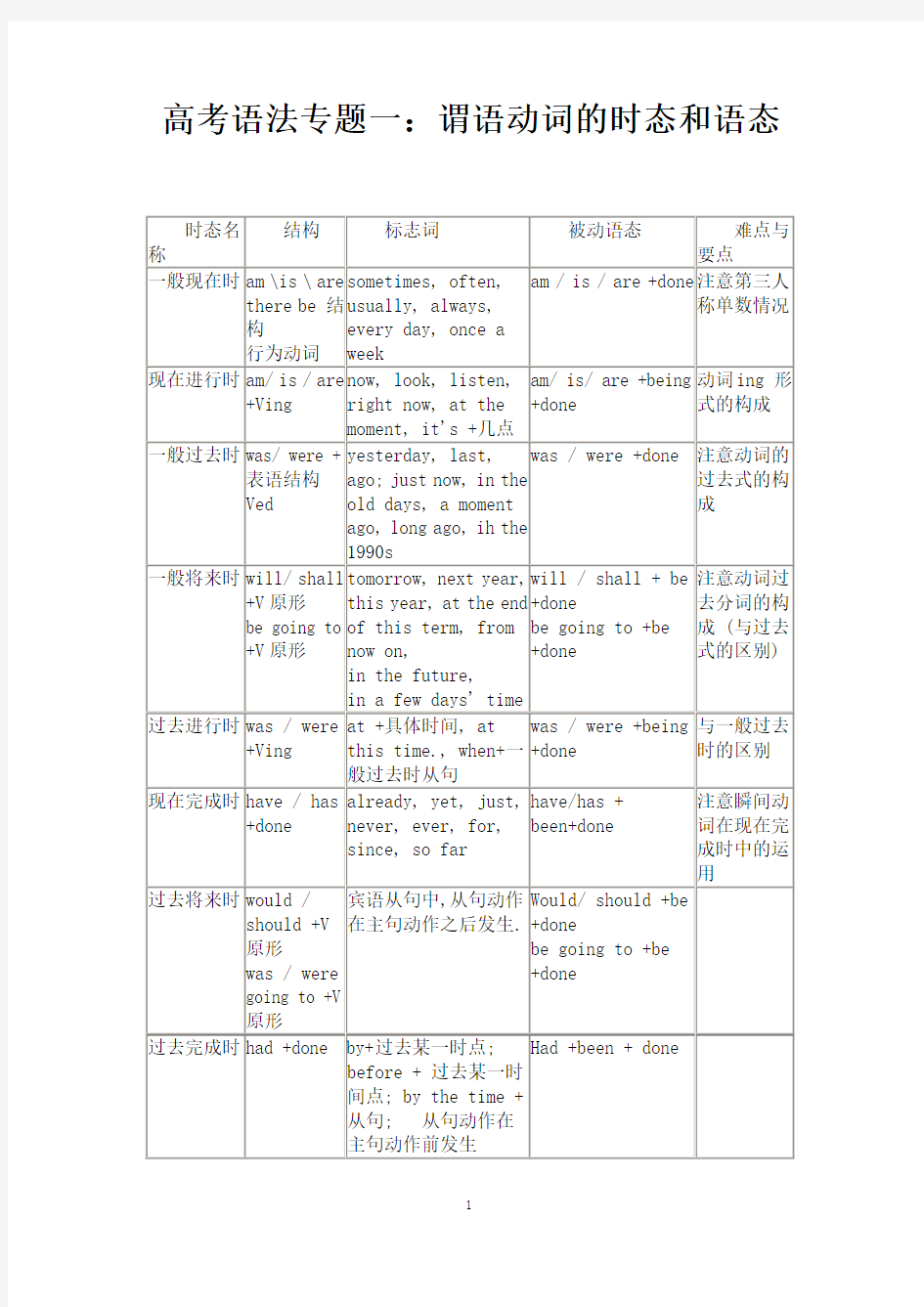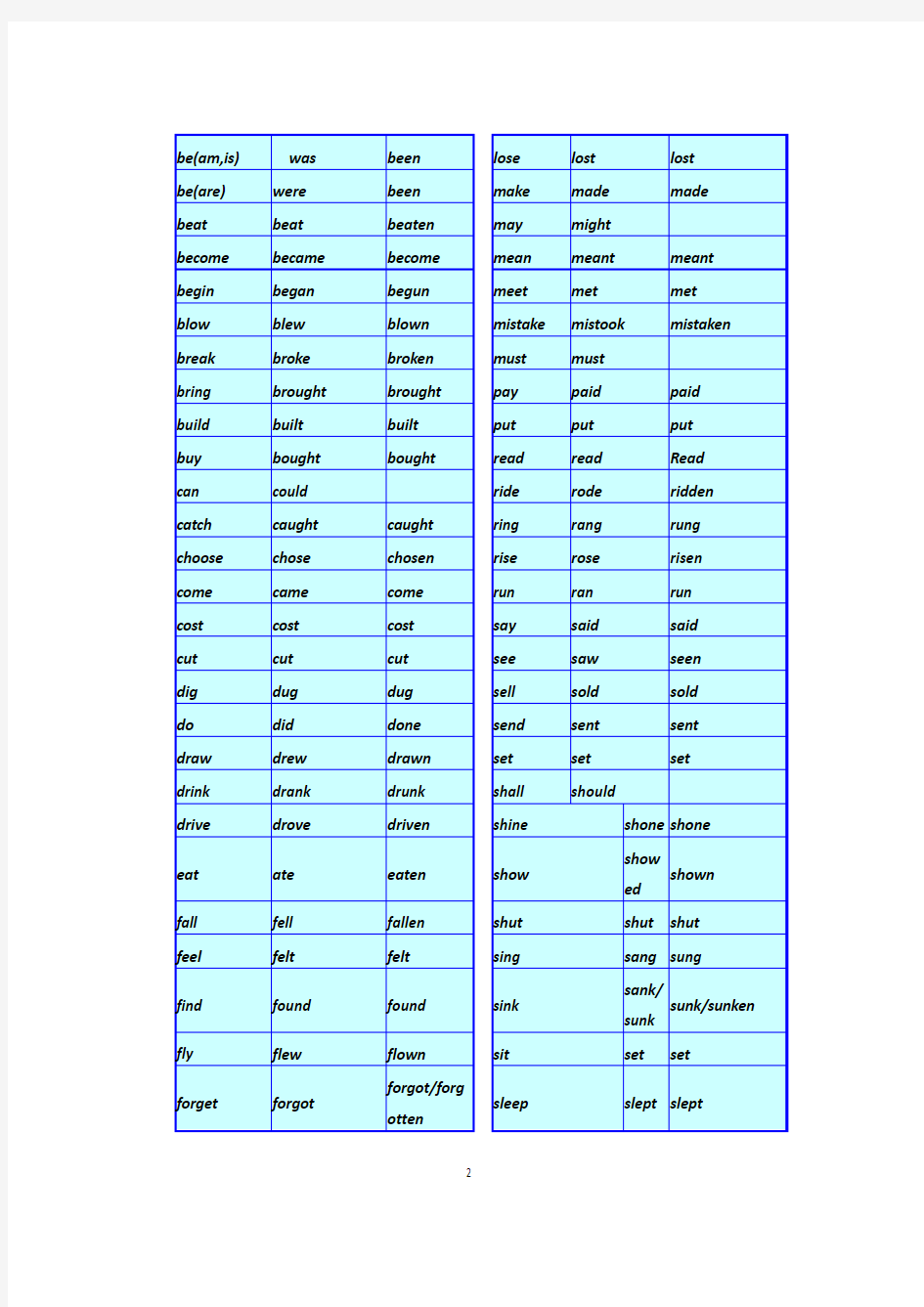高考语法专题一 谓语动词的时态和语态


高考语法专题一:谓语动词的时态和语态
一、时态的具体用法:
(1) 一般现在时 表示现阶段经常或习惯发生的动作或存在的状态,或说明主语的特征。
① 一般现在时句子中常有的时间状语:often,usually,sometimes,always,every (day
等), once/twice,a (week等), on (Sunday等),never,in the (morning等)。如:
They go to the Palace Museum once a year.(他们每年去一次故宫)/ They often
discuss business in the evening.(他们经常在晚上商谈生意)
②表示客观真理、事实、人的技能或现在的状态时句子里一般不用时间状语。
如:The earth turns round the sun.(地球绕着太阳转)/ Light travels faster than
sound.(光传播比声音快)
③在条件状语从句中(以if,unless引导),用一般现在时代替一般将来时,句子可以有
将来时间。如:Please ring me up as soon as you arrive in Germany.(你一到德国
就给我打电话) / If it rains tomorrow,we will have to stay at home.(如果明天下
雨我们就只好呆在家)
④人的心理活动和感官动作一般用一般现在时而不用现在进行时表达,常见动词
有:like, love, hate, dislike, want, wish, hope, think(认为),understand, remember,
forget, mean, need, hear, feel, see. 如:I think it is going to snow.(我想天要下雪
了)/ I really hope you can enjoy your stay here.(我真的希望你愉快地呆在这儿)
(2)一般过去时表示过去某时发生的动作或状态。
①表示过去具体时刻发生的一次性动作时,时间状语有:at (eight) (yesterday
morning),(ten minutes) ago, when引导的时间状语从句。如:I got up at 6:00 this
morning.(我是早上六点钟起床的)/ Tom broke the window at half past nine this
morning.(汤姆今天早上九点半把窗子打破了)/ When he went into the room,he
saw a stranger talking with his father.(他走进房间时发现一个陌生人正和他父
亲谈话)
②表示过去一段时间内不知何时发生的一次性动作时,时间状语有:yesterday,
last (year等), in (1998 等)。如:He came to our city in the year 2000.(他2000
年来到我们市)
③表示过去一个阶段中经常发生的事情时,时间状语有:last…, in…, from…to…,
for(10 years),often,usually, sometimes, always, never等。如:Mr Jackson usually
went to evening schools when he was young. / Every day he went to the rich
man and borrowed books from him.
④讲故事、对过去经历的回忆、双方都明白的过去事件等一般用过去时,而且经
常省略时间状语。如:I happened to meet Rose in the street.(我正好在街上遇
到露西)
(3)一般将来时表示将来某一时刻或经常发生的动作或状态。
①一般将来时的时间状语有:tomorrow,this (afternoon),next (year),one day,now,soon,
someday,sometime, in the future, when引导的从句等。
②用will构成的将来时,表示动作与人的主观愿望无关。“shall”用于第一人称,“will”用于所有人称。如:I will graduate from this school soon.(我很快就要从这所中学毕业了)/ You will stay alone after I leave.(我走了之后你就要一个人过了)
③“am/is/are going to+动词原形”表示打算或准备要做的事情,或者主观判断即
将要发生的事情,而“am/is/are to +动词原形”表示安排或计划中的动作。如:
A man told them that the woman was to give birth to the special baby.(有一个
人告诉他们那个妇女就会生下那个特别的男孩)/ It’s going to rain soon.(天快
要下雨了)
④现在进行时也可以表示将来。
(4)现在进行时现在进行时表示现在正在进行的动作。
①现在进行时由“助动词be (am is are ) +现在分词”构成。
②现在进行时的时间状语有:now, this …, these…等,但经常不用。如:What are
you doing up in the tree?(你在树上干什么?)/ I am writing a long novel these
days.(我最近在写一本长篇小说)
③表示即将发生的动作,一般指近期安排好的事情。常见的动词有:come, go, stay,
leave, spend, do等。如:I’m coming now.(我就来)/ What are you doing
tomorrow?(你明天干什么?)/ He is leaving soon.(他就要走了)
④表示频繁发生或反复进行的动作,常与always等频度副词连用,以表示赞扬、不
满或讨厌等感情色彩。如:He is always borrowing money from me and
forgetting all about it some time later.(他老是向我借钱,过一些时候就忘得一
干二净)
(5)过去进行时过去进行时表示过去某一时刻或某阶段正在进行的动作。
①过去进行时由“was(第一、三人称单数)或were(第二人称单数和各人称的复
数)+现在分词”构成。
②过去进行时的时间状语有:then, at that time, this time yesterday, at (eight)
yesterday (morning),(a year) ago, 以及由when引出的时间状语从句。如:He
was cooking supper this time yesterday.(昨天这个时候他正在做晚饭)/ The little
girl was playing with her toy when I saw her.(我看到小女孩的时候她正在玩玩
具)
③也可以表示过去一个阶段频繁发生或反复进行的动作,常与always等频度副词
连用,以表示赞扬、不满或讨厌等感情色彩。如:He was always borrowing
money from me when he lived here.(他住在这里时老向我借钱)
(6)现在完成时现在完成时表示一个已经发生了的、对现在仍有影响的动作。
①在完成时由“助动词have (has)+动词的过去分词”构成。
②表示发生在过去的对现在仍有影响的动作时,时间状语有:already, yet, just, once,
twice,ever, never,three times, before等。如:I have never seen such fine pictures before. (我以前从来没有看过这么好的画)/ He has just gone to England.(他刚去英国)
③表示在过去开始一直延续到现在(可能延续下去)的动作或状态时,时间状语有:
for (two years),since 1990, since (two weeks ago)和since引导的状语从句。如:I have been away from my hometown for thirty years.(我离开家乡有30年了)/ Uncle Wang has worked in the factory since it opened.(自从这家工厂开张,王叔叔一直在那儿工作)
④have been to与have gone to的区别:have gone to(“已经去了”)表示人不在这
里,have been to(“去过”)表示人在这里。如:--Where is Mr Li? –He has gone to the UK.(李先生在哪里?他去了英国。)/ --Do you know something about Beijing? –Yes,I have been to Beijing three times. (你知道北京的情况吗?是的,我去过那里三次。)
⑤在完成时中,一个瞬间性动词(一次性动作)不能与表示一段时间的状语连用,此时
须将该瞬间动词改为延续性动词或状态动词。具体变化见下表:
或者使用下面这个句型:
[注意] 在其它的时态中也存在类似问题,记住,关键是:瞬间动词不能和表达一段时间的状语连用。如:How long may I keep the book?(这本书我能借多久?)(句子中keep 取代了borrow)
(7) 过去完成时过去完成时表示过去某一时间或某一动作发生之前已经完成的动作。简
言之, 过去完成时所表示的时间是“过去的过去”。
①过去完成时由“助动词had+动词的过去分词”构成。
②过去完成时时间状语有:by (yesterday), by then, by the end of (last…)或者由
when,before等引出状语从句。有时句子中会有already, just, once, ever, never等
词语,也会有for…或since…构成的时间状语。如:They had already finished cleaning the classroom when their teacher came.(当老师来的时候他们已经打扫完
了教室)/ The woman had left before he realized she was a cheat.(在他发觉那个妇
女是个骗子时她已经走掉了)
③过去完成时常用于宾语从句中、after引导的从句中,或者从句是before引导的主
句中。如:After I had put on my shoes and hat,I walked into the darkness.(我穿上
鞋子戴上帽子走进了黑暗之中)/ He said that he had never seen a kangaroo
before.(他说他以前从来没有见过袋鼠)
(8) 过去将来时过去将来时表示在过去预计将要发生的动作或存在的状态。
①过去将来时由“助动词should(第一人称)或would(第二、三人称)+动词原形”构
成。在美国英语中,过去将来时的助动词一律用“would +动词原形”。
②过去将来时常由于宾语从句中,时间状语有:later, soon, the next (day).
二、被动语态
被动语态的基本结构为:be+动词的过去分词
一.被动语态的用法:在被动语态中,主语是动作的承受者,主要用于下列几种情况:(1)不知道动作的执行者是谁。如:This watch is made in China.更多资料QQ378459309制作:
(2)没有必要指出动作的执行者是谁。如:More trees must be planted every year.。(3)需要强调或突出动作的承受者时。如:Chinese is spoken by more and more people in the world.
二、主动语态和被动语态的转换
1.主动语态变为被动语态
(1)要将主动句里的宾语变为被动句中的主语,若主动句中的宾语是人称代词,要将宾格变成主格。
(2)把主动句中的主语变为被动句中的宾语,主格变成宾格,并用by引导。
(3)谓语动词变成相应的被动形式。
主动语态:动作执行者+谓语动词主动形式+动作承受者
被动语态:动作承受者+谓语动词被动形式+动作执行者
如:We asked him to sing an English song.(变为被动语态) →He was asked to sing an English song by us.
2.带双宾语的谓语动词变为被动语态
谓语动词带双宾语时,既可以将间接宾语转化成主语,也可以将直接宾语转化为主语。如:She gave me a book.(变为被动语态) →I was given a book by her.(间接宾语me改为了主语)
A book was given to me by her.(直接宾语a book 改为了主语)
3.动词短语变为被动语态
许多由动词和介词、副词构成的动词短语相当于及物动词,可以有宾语,也可以有被动语态。在变为被动语态时,不可丢掉构成动词短语的介词或副词。如:We should speak to old men politely.(变为被动语态)
Old men should be spoken to politely.(to不可省略)
4.变被动语态后动词形式的选择
主动句中在感官动词see,hear,watch,feel,notice等,及使役动词let,make,have 等后跟省略to的不定式,变为被动句时,应加上不定式符号to。如:He makes the girl stay at home.(变为被动语态)→The girl is made to stay at home by him.
三、解题技巧
在高考英语语法填空中,一般有一空是考查谓语动词的时态,同时有一空是考查非谓语动词,因此,首先要判断括号中所给动词是谓语动词还是非谓语动词;若是谓语动词,一是根据主语与谓语动词的关系判断用主动语态还是用被动语态,二是根据具体的语境来判断用哪一种时态,进而确定所填动词的形式。
例1:This proverb is saying we have to let things go in their natural course. Being too anxious to help an event develop often 40 (result) in the contrary to our intention. (2008广东)
分析:因句中Being too anxious to help an event develop是动名词短语作主语,括号中的result应当为谓语动词;主语与谓语动词是主动关系,再说短语动词result in本身是不能用于被动语态的,故用主动语态;根据语境,这段话是拔苗助长这个成语故事所说明的道理,“我们必须让事物沿着它们的自然进程发展。太着急帮助一件事物发展,结果往往和我们的意图相反(欲速则不达)。”这是客观真理,应当用一般现在时,主语是第三人称单数,故填results。
例2:The policeman’s attention was suddenly caught by a small box which __________ (place) under the Minister’s car. (2005广东)
分析:替代the box的关系代词which在定语从句中作主语,place应当为谓语动词;因主语which (the box)与place (放置)是被动关系,故用被动语态;又因place这个动作发生在was caught这个动作之前,即“过去的过去”,用过去完成时的被动语态,故填had been placed。
一、单句填空:用所给动词的适当形式填空。
1. The house belongs to my aunt but she____________ (not live) here any more. (全国I)
2. This machine _______________ (not work). It hasn’t worked for years. (浙江)
3. If their marketing plans succeed, they________________ (increase) their sales by 20 percent.
(全国Ⅱ)
4. Population experts predict that most people ___________(live) in cities in the near future. (上
海春)
5. He __________(play) football regularly for many years when he was young. (天津)
6. -- Have you known Dr. Jackson for a long time?
-- Yes, since she _________(join) the Chinese Society. (宁夏)
7. Teenagers ____________(damage) their health because they play computer games too much. (重庆)
8. I called Hnnah many times yesterday evening, but I couldn’t get through. Her brother
__________ (talk) on the phone all the time! (湖南)
9. John promised his doctor he _____________ (not smoke), and he has smoked ever since. (北京)
10. By this time tomorrow, I_____________ (lie) on the beach
11. So far this year we _________ (see) a fall in house prices by between 5 and 10 percent. (福建)
12. The hotel wasn’t particularly good. But I ____________(stay) in many worse hotels. (北京)
13. We first met on a train in 2000. We both felt immediately that we ____________ (know) each
other for years. (辽宁)
14. -- I’m sure Andrew will win the first prize in the final.
-- I think so. He _____________________ (prepare) for it for months. (江苏)
15. The telephone ________________ (ring), but by the time I got indoors, it stopped. (四川)
16. --Did you go to the show last night?
--Yeah. Every boy and girl in the area _______________(invite). (陕西)
17. -- What’s that noise?
-- Oh, I forgot to tell you. The new machine_______________(test). (浙江)
18. I like these English songs and they _______________ (teach) many times on the radio. (安徽)
19. Don’t take the magazine away. It _____________(belong) to me.
20. I will go to see my son when he __________(finish) the training course.
21. Perhaps it will be a long time before Tom ________(come)from abroad .
22. It’s time that we_______( take) some action to protect the environment.
23. Often a storm ________________(follow) by a calm.
24. If city noises ________________(keep) from increasing,people will have to shout to be
heard even at the dinner table 20 years from now.
25. I bought this radio yesterday,but it ____________(work).
26. A friend of mine ___________(return) to his house after a holiday only to find it had been
broken into.
27. When Jack arrived he _____________(learn) Mary had been away for about an hour.
28. We miss Ted a lot, for he ____________(kill) trying to save a child in earthquake.
29. Shortly after we ________(seat),a waiter came over to our table with a smile.
30. I have left the light of my office on, so I __________(go) back and turn it off.
31. The number of the guests who _____________(invite) to the wedding reaches 800.
32. Mr. Smith told us that he ______________(deliver) a speech the next week.
33. The professor asked his assistant whether his report _____________(complete) in a week.
34. I feel it is your husband who ________________(blame) for the spoiled child.
35. Selecting a mobile phone for personal use is no easy task because technology
_______________(change) so rapidly.
36.You can’t move in right now. The house ___________________(paint).
37.Shirley ____________(write) a book about China last year but I don’t know whether she has finished.
38. Henry remained silent for a moment. He _______________(think).
39. They believed that by using computers the production of their factory ________ (increase)
greatly.
40. We would like to go and thank him ourselves,but we ___________(not find) out his address .
41.I wonder why Jenny __________________(write) us recently. We should have heard from her
by now.
42. My father _____________________(employ) at this job since 1990.
43.The price _______________(fall) down,but I doubt whether it will remain so.
44. By the end of last year,another new gymnasium ____________(complete) in Beijing.
45.The little girl cried her heart out because she _____________(lose) her toy bear and believed she wasn’t ever going to find it.
46. Is this the third time that you _____________(be) late?
47. He ________________(write) the composition the whole morning and he is still working.
48. He __________________(learn) English for eight years by the time he graduates from the
university next year.
49.By this time tomorrow we _____________(repair) the machine.
50. The telephone _____________(ring) four times in the last hour,and each time it
________(be) for my roommate.
51. Helen _____________(leave) her key in the office so she had to wait until her husband
________(come) home.
52. I _______________(think) the room to be empty but found it occupied.
53.Visitors ______________ (request) not to touch the exhibits.
54.They _____________(catch) in a snowstorm on their way home.
55. —May I have a word with Miss Anna?
—Sorry, she ____(talk)to her friend on the phone.
56. When Nancy was at college, she ____(speak) three foreign languages, but I am surprised to
find that she ____ (forget)all except a few words of each.
57. By the end of next July this building ____(complete).
58. —Hurry, Mary! You ____ (want)on the phone.
—Oh, I ____(come). Thank you, Mom.
59. — Did you meet the pianist at the station?
— No, he ____ (leave) by the time I ____(get) there.
60..— How is the boy?
— Sorry. He ____ (die) though the doctor made every effort to save him.
61. — Bob must be wealthy.
— Yes, he ____ (earn)more in one day than I do in a week.
62. You can certainly leave the classroom as soon as your homework ____(do).
63. — Would you like to tell me what our teacher said just now?
— She said that light ____ (travel)faster than sound.
64. SARS ____ (break) out in Hong Kong in the winter of 2002.
65. Thousands of people took part in the work when the old temple ____.(rebuild)
66. This cloth you bought is cheap, but it ____well.(wear)
67. Here ____ (come)the professor and writer as well as his friends.
68. My money____(run out). I must go to the bank to draw some of my savings out before I’ve
none in hand.
69. Robert ____ (give)me his address the other day, but I’m afraid I ____(lost)it.
70. Shelly ____ (leave)California for Texas in 1996 and ____(work) there ever since.
II. 语篇填空
It was getting dark when I got home. It was cold and I _______1________(wear) a coat. I walked up to the door and put my hand into my pocket ____2____(take) out my key ____3______ I couldn’t find it. I suddenly remembered that I _____4____(leave) it on my desk in the office. It really didn’t make any difference. I knew my wife ___5_____(be) at home and the children must have come back from school by now, so I ___6_____(knock) at the door. There was no answer, so I knocked again. I continued knocking at the door for some time. I ______7______(get) angry. Then I remembered something the office boy had told me at noon.
He said that my wife ___8_____ (phone) saying that she _____9________(go) shopping in the afternoon with the children.
There was only one thing for me to do: I had to clime in _____10______ a window.
